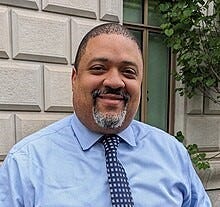This is the Professional Misconduct that the Supreme Court Buried. It is the Record of New York's DA Bragg. Part 1
The Review
In “The Supreme Court Buries Professional Misconduct” (Part One) and “The Supreme Court Buries Professional Misconduct Part Two,” the documented record —drawing special attention to 11 illicit publicity events —irrefutably establishes that the United States Supreme Court is in complicity with New York DA Bragg’s illicit prosecution against Donald Trump by means of wrongful extrajudicial publicity.
The following Bragg newsletters will show the depth of what Bragg did in the context of what the U.S. Supreme Court intentionally allowed in their burial of his professional misconduct. This is by no means an indictment of the personal lives of these nine Supreme Court members. What it is, is an evaluation of their professional lives. After all, they like, Bragg, are public servants obligated with the duty to uphold the rules of conduct of their profession. When they don’t uphold them, it is the American people that are defrauded because of it. This is because those rules, when it comes to publicity prohibitions, are designed to protect the inviolability of the Fifth and Sixth Amendment of the Constitution of the United States of America as stressed by the right of the defendant to be presumed innocent in all criminal prosecutions.
Who is Alvin Bragg? And What Did He Know and When Did He Know it?
At the outset, it is important to note that the following analysis has nothing to do with Alvin Bragg’s personal life. This, instead, is a straight-on professional evaluation. He is, after all, a public servant. As such, he is charged with serving the public by upholding the rules of conduct of his profession in how he prosecutes a case.
As a New York attorney, little was known about Alvin Bragg in the national arena. To the nation, he was just another attorney. That all changed on March 30, 2023, when, as the New York County District Attorney, he indicted former President Donald J. Trump on more than thirty counts of business fraud.
So, who is he? What did he know and when did he know it?
District Attorney Alvin Bragg is at the peak of knowledge and skill when it comes to his understanding of what a public prosecutor can’t do in the field of negative extrajudicial publicity against accused defendants. (To review, rule 3.6(a) Rule 3.8(f) and rule 8.4(d) prohibit the DA or his assistants and investigators from making extrajudicial statements that could materially prejudice the to be accused defendant’s rights or heighten the condemnation against him. Here is the link to those rules: https://www.americanbar.org/groups/professional_responsibility/publications/model_rules_of_professional_conduct/model_rules_of_professional_conduct_table_of_contents/
Alvin Bragg graduated from Harvard Law School in 1999. He received an education from what is widely regarded as the highest-ranking law school in the nation. As such, Bragg received the highest training in learning about public prosecutors being prohibited from prejudicing the defendant’s rights in the investigation and prosecution against that defendant.
Moreover, in addition to that Harvard Law School knowledge, Bragg achieved the highest honor in the field of civil liberties —which at the center lies the protection of fair trial rights for accused defendants, as guaranteed by the Fifth and Sixth Amendments of the Constitution of the United States of America. The honor was due to him being named the Harvard Law School Editor of the Civil Rights-Civil Liberties Law Review. Thus, from all educational perspectives, Bragg was at the top of the class in knowing what not to do when prosecuting criminal defendants well before he became a public prosecutor.
From there after law school graduation, Bragg was approved by the character and fitness committee of the Appellate Division of the New York Supreme Court and admitted to the practice of law in the state of New York, by the Appellate Division of the New York Supreme Court. He clerked for the United States District Judge for the Southern District of New York. From that vantage point, Bragg was in the position to serve that judge with what Bragg knew about extrajudicial publicity committed by public prosecutors. In 2009, he served as Assistant United States Attorney for the Southern District of New York. As such a public prosecutor, he again was in position to ensure that no one in that U.S. Attorney’s would engage in negative extrajudicial publicity against accused defendants.
At the conclusion of other public positions along the way, Bragg was ultimately elected to be the New York County District Attorney on November 2, 2021, and sworn into that office on January 1, 2022. It was in that official position, that he investigated and formally charged former President Donald Trump with the more than 30 counts of falsifying business records. We have seen the more than abundant knowledge that Bragg possessed on the prohibition of negative extrajudicial publicity against accused defendants. Now, we can see how Bragg graded out when it came to upholding and respecting that prohibition when it came to this Trump prosecution.
By seeing this, the American people will no longer be in the dark and led astray by what the news media propagates in intimating that there is nothing to see here when there is everything to see here.
That professional conduct assessment is coming up in the next newsletters.




Unfortunately we are familiar with Bragg’s extrajudicial misconduct in promising the public he will Get Trump if elected, even though the prior DA, the FEC, and possibly an attorney who wrote the book on the case as he saw it. All saw the case as a misdemeanor and not worth the time for a simple fine. These were all attorneys, subject to the RPC. I need to read SCOTUS’s involvement in this non proven Intent to commit a crime and 34 misdemeanors.